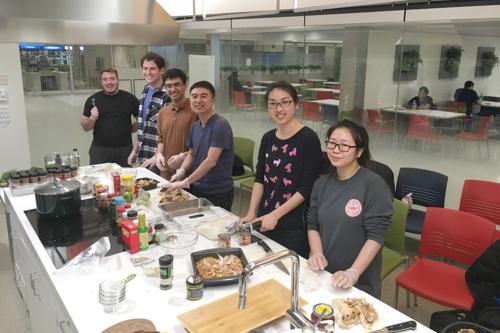Welcome to the resource page for Eat to Treat! Scroll down to find sign-up information, program information and resources.
About Eat to Treat
Eat to Treat was initially developed as an extracurricular seminar for first year Boston University Chobanian & Avedisian School of Medicine students. Versions of the program are now offered to dentistry students, addiction clinicians, and medical students.
Eat to Treat: For Practicing Clinicians
Eat to Treat for practicing clinicians is a continuing education course aimed to provide clinicians with tools to facilitate effective nutrition counseling and to improve the utilization of nutrition services at our hospital or the cite of their clinical practice.
Educational Objectives
- Define culinary nutrition and its function in the prevention and treatment of metabolic diseases.
- List at least two resources providers can use during short clinical visits to help start conversations about nutrition with their patients.
- Identify the key nutrition resources including referrals to a dietitians, medically tailored food/meals, and teaching kitchens.
- Identify ways to introduce culinary nutrition into practice, either through counseling, referrals, or shared medical appointments.
Target Audience
Physicians, nurses, physician assistants, dietitians, counselors and social workers, trainees, and other clinicians who work with patients requiring nutrition and lifestyle changes to manage and prevent weight-related chronic diseases.
Download the handout here.
Eat to Treat: For Medical Students
Eat to Treat: A Nutrition Course for Future Physicians is an extracurricular enrichment seminar designed to provide future physicians with a deeper understanding of nutrition and diet, and their impact on chronic disease. The course focuses on three domains:
- Nutrition knowledge: Students will gain a better understanding of basic nutrition and medical nutrition therapy as they relate to common nutrition-related chronic diseases.
- Nutrition counseling: Students will acquire specific skills to effectively counsel patients on nutrition as well as tactics to overcome cultural, social, and financial barriers to optimal nutrition. Additionally, students will gain an understanding of the role of the registered dietitian (RD) as a part of the care team and will learn how and when to refer to RDs and to other nutrition resources.
- Culinary skills: Students will learn basic culinary skills to enhance their practical understanding of nutritional interventions and to better relate to their future patients.
The course has been switched to an online format during the pandemic.
Download the course book here.
Read more about the course here
For more information contact SNAAC leadership

